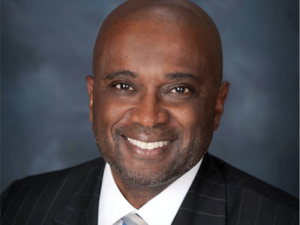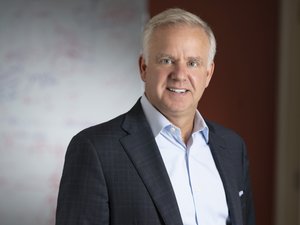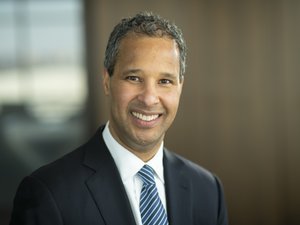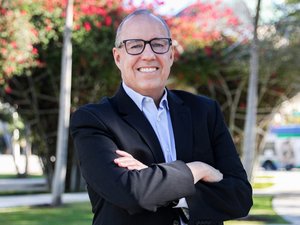At the end of a nondescript industrial park, on a dead end street in Vienna, Va., there’s an unlikely beer oasis.
Outside, patrons sip brews at sun-drenched tables, as cyclists cruise by on the abutting bike trail. Inside, the dining room and bar, flooded with natural light, is outfitted with trendy industrial chic. Edison bulbs suspended from wooden pallets hang from the ceiling, while the raw cement floor harkens back to the true industrial railroad space this once was. Behind the bar, a glass wall offers a glimpse into the alchemy occurring here, with views of stainless steel brew tanks stacked two stories high.
This is Caboose Brewing.
Matt Greer and Tim McLaughlin are living out most people’s fantasy. Tired of drinking craft beers at the local grocery store, the two tech executives decided to build their dream bar, with top-notch food to go along with it, just down the road from their homes.
They hired a brewer, Chris Mallon, who previously worked at Heavy Seas Brewery in Maryland. They hired a chef, Brandon McDermott, of D.C.’s Lincoln, and a sous chef from Restaurant Eve. And they set out to create a haven of quality brews with a equally impressive menu to complement.
“We occasionally get shit because people say ‘your food is snooty,’ and we say ‘no, our food is good.’ We think that you should want good food to go with good beer,” says McLaughlin.
We think that you should want good food to go with good beer""
The food at Caboose is mostly sourced within 100 miles of the brewpub. The culinary team has partnered with local farms such as Maple Avenue Market, Lancaster Farm Fresh Co-op, Yohanan Farm, FireFly Farms and Trickling Springs Creamery. The beef is grass-fed, the poultry pasture-raised and everything on the menu is crafted from scratch.
And, being a brewery, after all, the brewing process is represented in multiple ways throughout the menu, with features like charcuterie crackers made with rye and barley malt left over from brewing, Carhopper IPA mustard and Hobo Stout candied bacon.
It’s not often you find two beer guys and restauranteurs who can also speak eloquently about the local cybersecurity and tech scene. In between discussions of duck liver pate and double IPAs, names of Mandiant executives and other area tech companies are casually dropped into conversation.
Matt Greer has founded multiple startups and spent five years at Mandiant as a director of IT and infrastructure. He left shortly after the company was acquired in 2013 by cybersecurity giant FireEye to start conversations with McLaughlin about Caboose.
Tim McLaughlin founded SiteWorx, a digital agency focused on B2B solutions, in 2002. SiteWorx has since grown to over 200 employees and in 2012 took a private equity investment from Los Angeles-based RLH Equity Partners. As part of the deal, McLaughlin cashed out a portion of his shares, telling the Washington Business Journal at the time he hoped to set some money aside for his family and some angel investing.
Soon after McLaughlin’s exit and Greer’s departure from Mandiant, the two hatched a plan for a brewery and restaurant and started looking for space.
Caboose’s Vienna location is unassuming, and at first glance, a bit odd. It is the last building in a row of what used to be industrial warehouses close to a rail line. But that rail line is now the W&OD bike trail and that’s where the two founders saw an opportunity. “The trail in the summer is basically our advertising,” says Greer.
And inside the end piece of real estate, a high-ceilinged, old school industrial space lent itself perfectly to the vision McLaughlin and Greer had in mind. “We knew we wanted to keep it as raw as we could,” McLaughlin explains. Floor-to-ceiling I-beams remain exposed, while cement floors and the Edison bulbs hanging from shipping pallets recall the storage and commercial purposes the building once served.
The artwork at Caboose also aims to capture that raw feel. Working with a local graffiti artist to help them source talent, McLaughlin and Greer give stipends to area artists to periodically install pieces of their work at the brewery.
Behind the fourteen-seat bar, large glass windows provide a view of the brewery operations. The large tanks required some custom engineering given the relatively small footprint of Caboose’s space; bright tanks are stacked two high in the cramped room. McLaughlin at one point scales a ladder to pour a taste from the second level.
“Each time we brew we’re brewing 15 barrels, which is just under five hundred gallons of beer. And it takes us about 6 hours to do that,” says Greer. The vast majority of that beer goes straight into kegs or through draught lines out into the tasting room. The only current offering that you might spot in a local bottle shop is the Vanilla Hobo Stout, available in large format bombers along with its limited production, barrel-aged big brother.
Much of Caboose’s rotating portfolio features beer names with nods to the property’s railroad roots. There’s the Carhopper IPA, the Localmotion Imperial IPA and the Casey Jones Rye Pale Ale.
Caboose beers are currently on draft in roughly forty restaurants and bars in the DMV. The brewery also had an offering at Wolf Trap this summer, and is planning on making a special beer next season for the Vienna-based National Park and concert venue. And being familiar with the startup community, Caboose’s beer can be found on tap at some local MakeOffice locations.
But getting their beer to the masses wasn't initially so easy. The nuances of beer distribution in Virginia provided somewhat of a rude awakening to McLaughlin and Greer at the outset.
“Virginia is really messed up,” say Greer. "We have laws that date back to the Prohibition and even pre-Prohibition. It’s a three-tiered system that keeps manufacturing away from retailing away from distribution. So, Tim and I are not allowed to be anything other than manufacturers of alcohol.”
Furthermore, franchise provisions create an almost unbelievable framework benefitting distributors. Once you sign with a distributor, you are tied to them in perpetuity. And it doesn’t even have to be in writing. As soon as a distributor accepts an order from a brewery, the brewery has effectively signed a “non-terminable, non-exitable contract. You’ve never heard of something like this in your life,” says McLaughlin.
So rather than dealing with an established distributor, the pair decided that if they were going to commit to a lifelong, verbal, non-exitable contract, they would execute it with the two people with whom they had already made such agreements.
“We signed with a distribution company that we asked our wives to create,” says Greer. “ABC [Virginia’s Alcoholic Beverage Control authority] told us that this was the workaround.”
Their wives’ distribution company, Ferment Nation, now handles distribution duties for Caboose, as well as James River Brewery, Sehkraft Brewing and Denizens Brewing.
Of course, despite the antiquated regulations, frustrating bureaucracy and unexpected challenges, the brew pub business has some obvious perks. “The greatest part about this industry is that you get to sit around and eat and drink and you’re actually working,” Greer jokes.
Caboose is just over two years old, but has already hatched ambitious plans. While other young breweries might be focused on simply scaling up their production capacity or refining the recipe on flagship brews, Caboose has an aggressive new project in the works.
In late 2015, McLaughlin and Greer signed a lease in Merrifield’s Mosaic District, just south of the Dunn Loring Metro station. The six thousand square foot warehouse space is twice as large as Caboose’s Vienna location and has an additional three thousand square feet of beer garden space.
The landlord of the space is EDENS, the national development company behind projects like Union Market. But, says Greer, “this will not be a typical EDENS property.” He promises it will be “far less ‘slick’ and more similar to the Vienna Caboose location.” The pair are expecting Fairfax County permit approval in the coming months, with construction slated to begin later this year and a target opening in early spring 2017.
Caboose has already been granted license to operate as a brewery and winery on-site, where they plan to scale up beer production and add cider to the mix—“for now.” After all, the new space offers new flexibility.
Greer and McLaughlin float the idea of adding distilling to their repertoire in the future. They hope to incorporate live music into the new venue. Other concepts include making some food for wholesale, roasting coffee, and “allowing the mobile workforce to plop down for some free wifi, while we tend the beer.”
“The vibe will be noticeably different than the Vienna Caboose with a more casual feel,” says Greer. But no matter what shape the Mosaic Caboose takes, you can be assured that its founders are going to be enjoying themselves.
“It’s so much fun,” says Greer. “You can’t help but win.”




